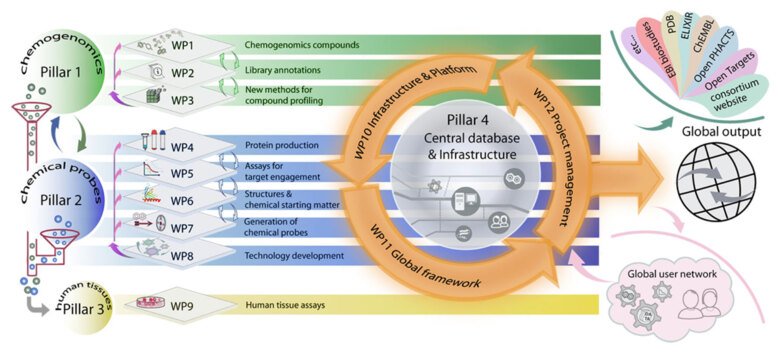Our research
The SGC Karolinska laboratory, under the direction of Prof. Michael Sundström, is housed within the Department of Medicine, Solna at Karolinska Institutet (KI), and located at the Centre for Molecular Medicine (CMM).
The SGC Karolinska laboratory focus on exploring novel target biology for future drug development. This is done with focus on chronic inflammatory diseases, neurodegenerative diseases and liver fibrosis. We are part of the Structural Genomics Consortium (SGC), a public-private partnership that supports the discovery of new medicines through an open science model. Our research focuses on three scientific areas i) patient derived cell-based assays and models ii) generating recombinant proteins and antibodies to selected targets from our collaborative network, and iii) identification, sourcing and validation of chemogenomic tool compounds for selected target families and proteins, such as GPCRs and Ion Channels.
We have a particular interest in studying inflammation and autoimmune disease mechanisms in inflammatory bowel diseases, neuroinflammation and liver fibrosis. We have research efforts in protein and antibody production, cell culture, patient-derived cell-based assays and models based at CMM. Through collaboration with Evert Homan and co-workers (Department of Oncology and Pathology, KI) within the EUbOPEN project (IMI), we also perform studies in the areas of chemogenomics and cheminformatics. All research is performed as open science studies; immediately making all research data and outputs publicly available.
EUbOPEN – Enabling and Unlocking Biology in the Open
SGC Karolinska is a partner in the EUbOPEN project (Enabling and Unlocking biology in the OPEN), a consortium that has been granted almost EUR 66 million (SEK 690 million) by the European Innovative Medicines Initiative (IMI) and its partners. The funds are used to develop, test, and make available chemical substances and other research tools that can pave the way for the development of new medicines and treatments for diseases such as inflammation and cancer. The project involves 22 partners from academia and industry who together work to develop and validate high-quality drug-like chemical substances and other research tools such as antibodies, and subsequently profile these research tools in translational medical studies. Michael Sundström, Scientific Director, SGC Karolinska, leads the operation together with other researchers at Karolinska Institutet.
The consortium will also test and analyse the substances in disease-relevant models of human tissue in the fields of immunology, oncology and neuroscience. Results, chemical substances, antibodies, analysis protocols and associated research data are made openly available to the research community without restrictions on the EUbOPEN web site.

The project's funding comes partly from IMI, and partly from the pharmaceutical industry organisation the European Federation of Pharmaceutical Industries and Associations (EFPIA), IMI-associated partners and other international partners. IMI is a collaboration between the EU and the European pharmaceutical industry, the purpose of which is to accelerate the development of and access to new innovative medicines in areas of high unmet medical needs.
